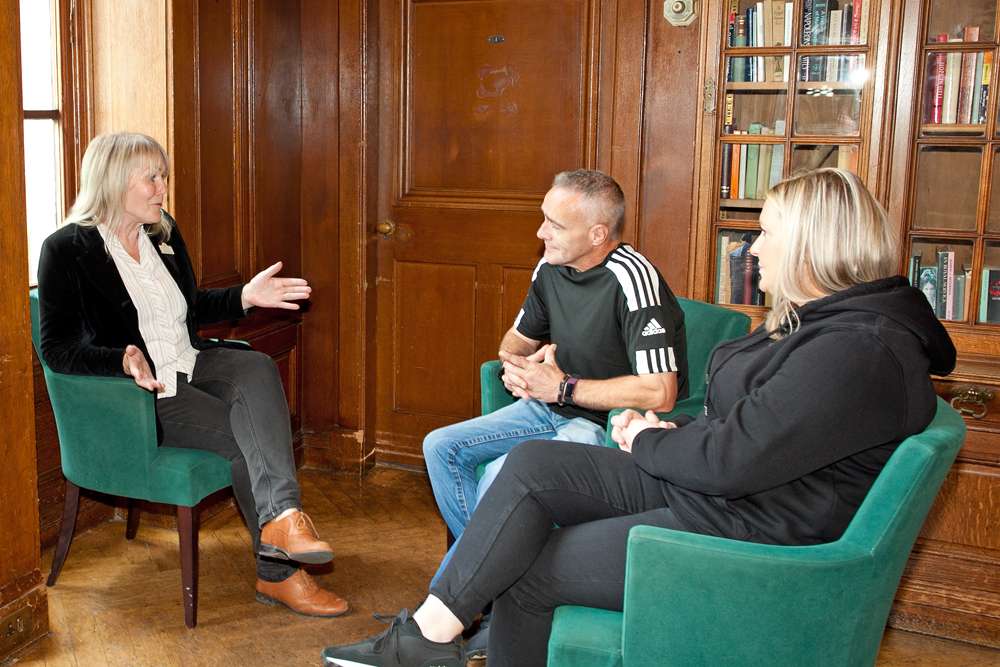The old adage “out of the frying pan, into the fire” means escaping one difficult situation only to find yourself in another. This is often what happens with cross-addiction. Cross-addictions occur when you swap one addictive behaviour for another, like overcoming a drug habit only to develop a problematic relationship with alcohol or food. No matter how different these behaviours seem on the surface, they’re all attempts to cope with underlying issues in unhealthy ways.
What Does ‘Cross Addiction’ Mean?
Cross addiction, also referred to as addiction interaction disorder, quite simply means swapping one addiction for another. People often assume that if someone stops using their substance of choice, they’re cured. However, recovery isn’t so straightforward. It’s full of challenges and requires constant vigilance to avoid falling into old patterns or developing new ones.
The psychological impacts of cross-addiction can be devastating; it can seem like you’re trapped in a never-ending cycle with no way out. Societal stigmas don’t make things any easier either – instead of getting the support needed, you might feel judged or misunderstood. This is where support systems come into play; they’re crucial for anyone navigating through the complexities and recovery challenges associated with cross-addiction.
Why Does Cross Addiction Happen?
You might be wondering why addiction transfer happens. Various risk factors can make you more vulnerable to this type of behaviour, including a history of substance misuse, underlying mental health conditions, or a lack of healthy coping mechanisms. It’s crucial to understand the psychological behaviours driving cross addiction as it often stems from an attempt to manage stress and pain in unhealthful ways.
Risk Factors
Swapping one vice for another isn’t uncommon, but certain risk factors increase the likelihood of falling into the trap of cross-addiction. A blend of genetic predisposition, environmental influences and socioeconomic factors can create a potent cocktail that makes some individuals more prone to developing addictions than others.
• Genetic Predisposition: Scientists have discovered certain genes that make individuals more likely to develop addictive behaviours. If you’ve got a family history of substance misuse or addiction, you might be genetically predisposed to fall into the same patterns.
• Environmental Influences: An unstable or stressful environment can significantly increase your vulnerability to cross-addiction. For instance, if you’re surrounded by people who regularly misuse substances or engage in addictive behaviours, you may find it harder to resist these temptations.
• Socioeconomic Factors: These include your level of education, job status, and income level. For example, high-stress jobs with little support can lead to substance misuse as a coping mechanism.
Emotional triggers and mental health conditions also play significant roles in the development and maintenance of addictions. Conditions like anxiety disorders, depression or bipolar disorder often coexist with addiction – creating a vicious cycle where each condition fuels the other.
By understanding these risk factors and recognising how they interact with each other in your life, you’re better equipped to break free from the grip of cross addiction – fostering healthier habits instead and finding your sense of belonging in positive communities.

Download Our Brochure
Common Cross Addictions
You might be surprised to learn that addictions can overlap and intertwine, sometimes leading you from one harmful dependency to another. You may have battled with a substance addiction, only to find yourself grappling with a gambling problem, an unhealthy relationship with food, or an excessive need to shop. These are all common cross addictions and understanding the psychological behaviors behind them is crucial in helping you navigate your path towards recovery.
Gambling Addiction
You may have thought you finally had your addiction under control, only to find that the rush from placing bets triggers a similar response in your brain as your previous addiction. This isn’t surprising as many addictive behaviours share common traits – they provide an escape, offer quick gratification, and are often used as coping mechanisms for stress or emotional pain. But much like drug or alcohol addiction, gambling addiction can lead to devastating financial consequences, strain family relationships, result in legal issues and bring about unwanted social implications.
- Gambling Triggers: Similar to substance misuse or compulsive behaviours like shopping or eating disorders, gambling is often triggered by certain emotions or situations such as stress or boredom. Understanding these triggers can help you avoid falling into this addictive behaviour.
- Financial Consequences: Gambling can quickly drain your finances leaving you in heavy debt which could take years to recover from even after seeking professional help.
- Family Impact: Your loved ones suffer too when gambling becomes an obsession. It leads to strained relationships due to broken trust and neglected responsibilities.
- Legal Issues and Social Implications: Compulsive gamblers often resort to illegal activities such as fraud or theft in order to fund their habit leading them into legal trouble; there’s also the risk of isolation as friends distance themselves due to changes in behaviour.
Remember, overcoming a substance use disorder isn’t just about stopping the drug and alcohol misuse —it’s also about not substituting those with equally destructive habits such as gambling. Stay vigilant and seek support when needed because you’re not alone on this journey towards recovery!
Food Addiction
Just like the allure of a casino, the kitchen can become your new battleground as you find yourself struggling with food addiction. It’s not just about physical hunger; emotional eating triggers often play a substantial role in this type of addiction. You might find yourself reaching for comfort foods when you’re stressed, anxious, or even bored. This predictable pattern of food cravings can leave you feeling out of control and powerless over your dietary choices. The impact on your physical health is significant too, potentially leading to obesity, diabetes and heart disease.
Sex Addiction
This form of cross-addiction is deeply rooted in intimacy disorders, which can make forming healthy relationships feel like an uphill battle. The media’s influence on our perceptions of sex and sexuality can also exacerbate this issue, creating unrealistic expectations that further complicate your struggle. Moreover, the digital age has brought about online triggers — explicit content is just a click away, making it harder to resist temptation and easy to fall back into destructive patterns.
Exercise Addiction
While it’s commendable to maintain a regular fitness regimen, there’s a fine line between dedication and obsession that can lead to exercise addiction, a condition that often goes unnoticed due to society’s emphasis on physical health. What you might initially perceive as an admirable commitment to fitness could gradually turn into an ‘exercise compulsion’, where the thought of skipping a workout causes extreme anxiety or guilt. This compulsion is not driven by the joy of being active but rather by fear and distress. Evidence suggests that people with this type of addiction may also suffer from ‘overtraining syndrome’, characterised by decreased performance, fatigue, altered hormonal states, and poor sleeping patterns.

Free Addiction Assessment
Warning Signs To Look Out For
You’ve got to stay vigilant for the warning signs of cross-addiction, such as finding yourself increasingly dependent on a new substance or behaviour. It’s a common misconception that switching from one addiction to another, like substituting drugs with excessive exercise, is part of healthy relapse prevention. However, this couldn’t be further from the truth.
Addiction isn’t about the specific substance or behaviour; it’s a mental health issue rooted in your brain’s reward system. Peer influence can sometimes blur the lines between what’s considered normal and addictive behaviours. For instance, if everyone around you is hitting the gym daily, you might overlook your own excessive workout routines as an emerging exercise addiction.
Here are three key signs to watch out for
1. Compulsion: You feel an intense need to engage in the behaviour or use the substitute substance even when it starts causing harm.
2. Neglecting Responsibilities: Your work performance declines or personal relationships suffer because you’re prioritising the new addiction over everything else.
3. Withdrawal Symptoms: If you try to stop or reduce engagement in this behaviour or use the substitute substance, you experience restlessness, irritability and other withdrawal symptoms.
Remember that awareness forms a crucial first step in tackling any crisis including cross-addiction. Connecting with understanding peer groups who share similar experiences can help create a sense of belonging while combating isolation during challenging times – so reach out today.
How to Avoid Cross-Addictions Developing
Understanding and addressing the root cause of your compulsive behaviours is a critical step in preventing cross-addictions. Staying connected to a recovery programme, even after initial success, can provide you with ongoing support and tools to keep potential substitute addictions at bay. Furthermore, maintaining healthy habits and relationships plays an instrumental role in your long-term sobriety by providing positive influences and distractions from addictive tendencies.
Addiction Treatment – Tackling The Root Cause of All Compulsive Behaviours
Holistic Therapies can provide effective ways of managing stress and improving overall mental health, helping you better handle triggers. Family dynamics play a significant role too; they can contribute both positively and negatively towards your recovery process. Unhealthy dynamics might have contributed to your addiction in the past; hence, addressing them is crucial if you want long-term recovery.
- Identify Emotional Triggers: What situations or feelings instigate your addictive behaviour?
- Explore Holistic Therapies: How can you manage stress and improve mental health holistically?
- Understand Family Dynamics: Are there any family issues contributing to your addiction?
Developing new coping mechanisms is another critical aspect of treatment – this allows you to deal with life’s ups and downs without resorting back to destructive habits. Remember that overcoming an addiction isn’t about substituting one bad habit for another but rather developing healthy habits that meet those same needs in non-destructive ways. Be patient with yourself throughout this journey – progress comes gradually but surely when we face our demons head-on.

Discover How We Can Help You
Stay Connected with Castle Craig
Beginning a recovery programme is key to your success; it provides the much-needed framework and support, propelling you towards lasting sobriety. Though this journey isn’t an easy one it’s important to remember that you’re not alone in this battle. At Castle Craig – we understand firsthand what you’re going through.
Engaging in therapy offers immense benefits that go beyond sober living. It equips you with emotional resilience to navigate life’s ups and downs without resorting back to old habits. Addiction therapy helps you identify triggers, develop coping strategies and ultimately heal from past traumas that might have contributed to your addiction. You’ll learn essential skills such as self-awareness, stress management, assertiveness and problem-solving – all invaluable assets for long-term sobriety and healthier relationships.
Remember: staying connected with a recovery programme doesn’t mean admitting weakness; it’s about embracing empowerment and growth while recognising our shared human need for connection and belonging.
Maintaining Healthy Habits and Relationships
Embracing healthier habits and nurturing positive relationships can significantly boost your journey towards lasting sobriety. Building resilience is a crucial aspect of this process; it’s about learning to bounce back after setbacks, and understanding that recovery isn’t always a straight path but a journey with ups and downs. Regular exercise, balanced nutrition, and adequate sleep – these are all cornerstone habits that can foster both physical and mental resilience.
Coupled with emotional regulation skills, which help you manage feelings without resorting to substance use, these practices can be powerful tools for stress management. Remember, it’s perfectly okay to seek professional help when dealing with overwhelming emotions or situations.
Start Your Journey to Freedom Today
Don’t let addiction define your story any longer. At Castle Craig, we are here to guide you toward a life of healing, strength, and renewed purpose.
We understand that your journey is unique, and so is your treatment plan. We personalise our approach to meet your specific needs, empowering you to break free from the cycle of addiction.
Experts You Can Trust
With a wealth of knowledge and services to help you regain control of your life, request a call-back from one of our professionals today. The choice you make today could change your life forever.



